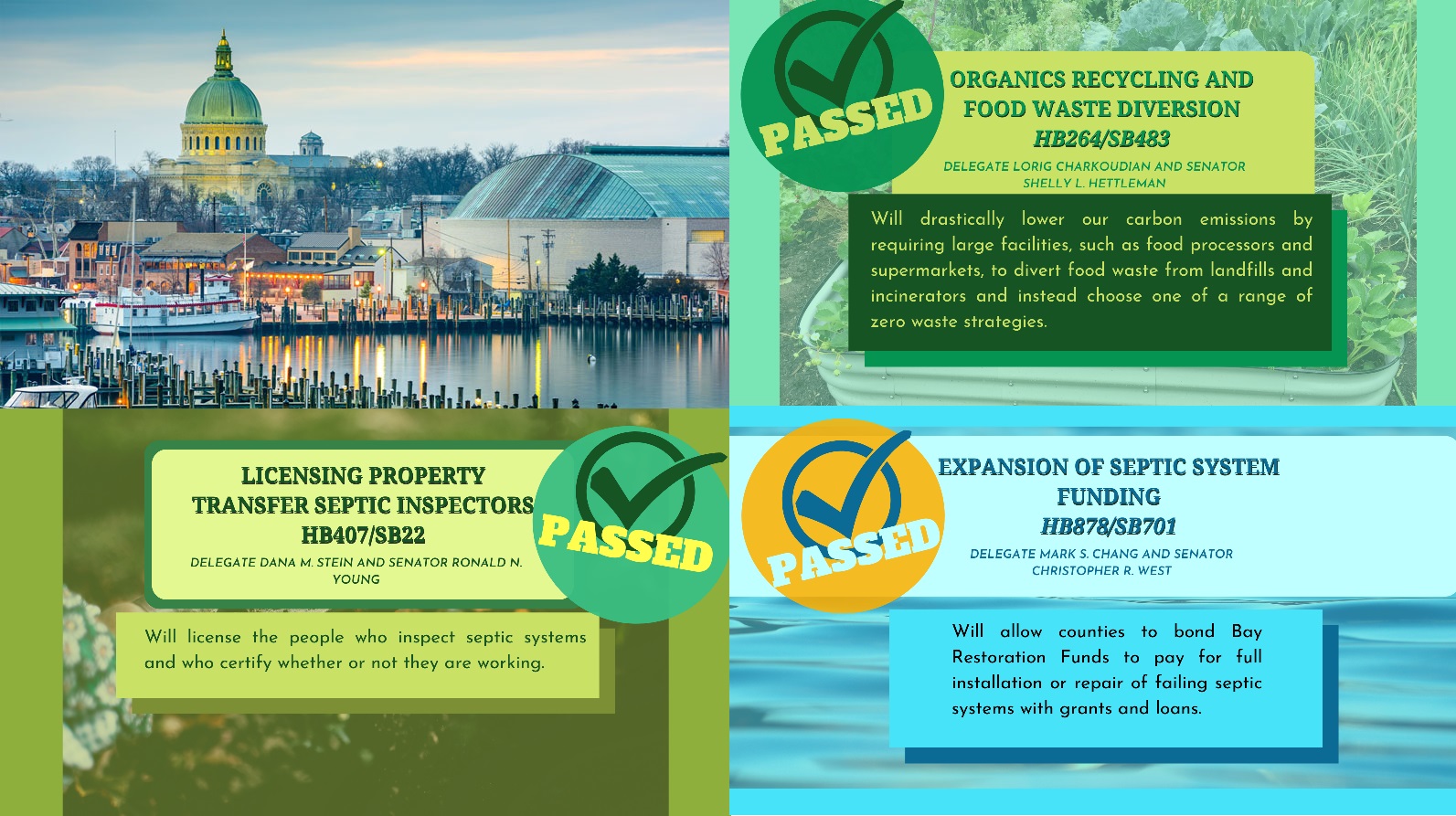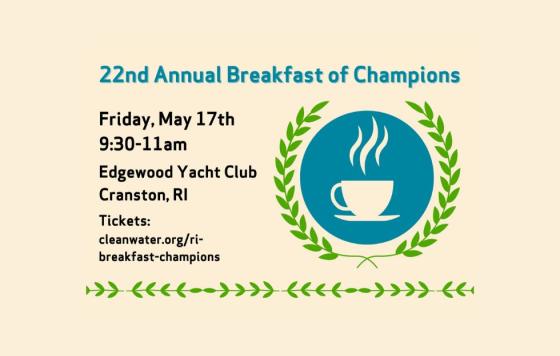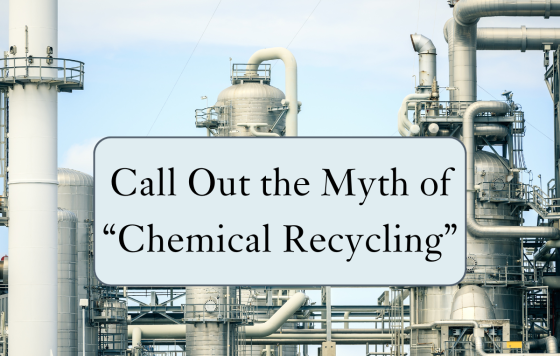
Monday was the last day of Maryland's Legislative Session. Maryland has a 90 day legislative session - it runs straight from January to April. Once it ends, the legislature can come back via Special Session to vote on legislation or override vetoes, but those are not common. So, this concludes our chance to change state law in 2021.
Over the course of legislative session, Clean Water Action members sent over 4,400 emails to legislators supporting our priority legislation and, in some cases, responding to legislation that surprised us, for good or bad. Thank you so much for taking the time to take action and spread the word. Your help made an incredible difference, especially during a legislative session where our staff could not be in the hallways to talk to legislators. Every time a legislator said, "I've had constituents reaching out" or "I've received emails on..." that was you making a difference.
And now, the 2021 legislative session has ended. What does that mean for our Maryland clean water priorities?
Organic Diversion and Zero Waste
This package of legislation reduces the amount of organic waste heading to landfills and incinerators, clarifies that Maryland law should NOT count burning trash as recycling or renewable energy, establishes extended producer responsibility for packaging, and preemptively bans the chemical conversion of plastic to fuel.
-
Victory: reducing the amount of organic waste heading to landfills and incinerators. HB264/SB483 are both on Governor Hogan's desk! Read more about the bill here.
-
Victory: clarifying that burning trash is NOT recycling. HB280, the House version of the bill, passed and is heading to the governor! The House never passed the Senate's version of the bill, SB304. A huge thanks to Delegate Charkoudian and Senator Pinsky for their leadership on this issue. Read here why this is important - up until now, when you took your plastic bags in for recycling, they might have been sent to an incinerator!
-
No victory yet: removing trash incineration from Maryland's Renewable Portfolio Standard. Unfortunately, the House Economic Matters Committee voted down HB332 and Maryland ratepayers will continue to subsidize burning trash as "renewable energy." Read our commentary with the Public Employees for Environmental Responsibility in Maryland Matters here.
-
No victory yet: bills to address plastic pollution, recycling industry problems, and source reduction, like HB21 (banning plastic-to-fuel chemical conversion), HB84 (Right to Repair), HB1146 (promoting mattress recycling), HB36 (establishing Extended Producer Responsibility), and HB807 (comprehensively studying the Maryland Recycling Act and regional solid waste management), didn't make it over the finish line - lots more to do next year!
Better Septic Regulations
Your barber and interior designer are licensed and regulated in Maryland, but the septic industry is not. We've been working on a series of bills every year to reform this system to protect people's health and pocketbooks.
-
No victory yet: creating a regulatory licensing board for the septic industry. HB302 passed the House, but the Senate decided to create a workgroup to study the issue over the summer. We will work with the Committee and stakeholders to make sure that water quality remains a key feature in conversations.
-
Victory: licensing property transfer inspectors. HB407/SB22 both passed and are on the governor's desk! This means that the people who tell homeowners and homebuyers whether or not their septic system works will have a professional licensing system like comparable industries in Maryland.
-
Victory: allowing counties to bond Bay Restoration Funds for septic repairs. HB878/SB701 both passed and are on the governor's desk, giving counties more flexibility and residents more tools to fund septic repairs.
Environmental Justice
Maryland's Environmental Justice Commission could be an impactful tool to promote decisions that promote environmental justice, but over the years it has languished. We are supporting a re-chartering of the commission to include more community involvement, more transparency, and to have it play a role in reviewing agency plans and some proposed legislation.
-
Partial victory: SB674/HB1207 took some, but not all, of the amendments we were supporting. In its final form the commission will have more transparency, but has neither the staffing nor teeth to significantly review agency plans and proposed legislation on its impact.
Pollinator Protection Act of 2016 - five years later
The legislation needed a technical fix! The legislation was intended to restrict the sale of neonicotinoid pesticides to only registered pesticide applicators, but it has been interpreted to allow stores that sell to registered pesticide applicators to ALSO sell to the public.
-
Victory: HB208/SB375 passed and is on the governor's desk!
Worker Protections
Healthy food workers are critical to keep food on our shelves. When workers fell ill to COVID-19, the resulting shock in the food system lead to empty shelves and the mass slaughter (but not for food) of millions of chickens. We are supporting legislation to expand sick leave and to require COVID-19 protections for workers at the workplace and in worker-provided housing.
-
Partial victory: while none of the bills we were working on passed before Crossover (an important date in Maryland by when a bill has to clear on chamber), HB581 managed to pass the House late and the Senate quickly took it up and passed it on Sine Die. The version that passed has significant language to improve conditions for food and farmworkers, but also sets troubling precedent on paid sick leave.
PFAS Ban
PFAS is a forever chemical that persists in the environment long after it is used. It is commonly used to create non-stick surfaces, on packaging and pots, exposing humans to this dangerous class of chemicals and allowing them to escape into the environment.
-
No victory yet: HB22/SB195 would have banned various materials, like firefighting foam, rugs and carpets, and food packaging, from using PFAS, and would have also have prohibited the incineration of PFAS. Neither the House nor Senate passed this PFAS ban, which is very disappointing. Read the Sunrise Movement's take on why this bill is so important.
Forest Conservation
Many members quickly sprang into action to oppose two bills that would have harmed forest protections.
- Victory: HB682 would have expanded what type of material can be burned under Maryland's renewable energy portfolio standard. The RPS already includes lots of dirty energy sources, like trash incineration; another is burning biomass, narrowly defined to mostly include chicken manure. This bill would have included burning wood pellets and forest products; rather than passing it, the House Economic Matters Committee decided to send it to a summer study.
- Victory: HB991 would have reintroduced forest banking (where developers paying for existing trees to be protected instead of planting new ones when they cut down forest) to Maryland's forest conservation rules. After fierce opposition, the bill was amended significantly to only grandfather properties that were previously in the program (the Attorney General determined banking violated Maryland's no net loss of forest laws), sunset the legislation for after a comprehensive study on the effectiveness of Maryland's Forest Conservation Act is finished, and include the 5 million tree planting provisions that were part of the un-passed Climate Solutions Now Act. Wow - talk about turning lemons into lemonade!
Thanks again for all you do and consider making a donation to Clean Water to help support work like this!



